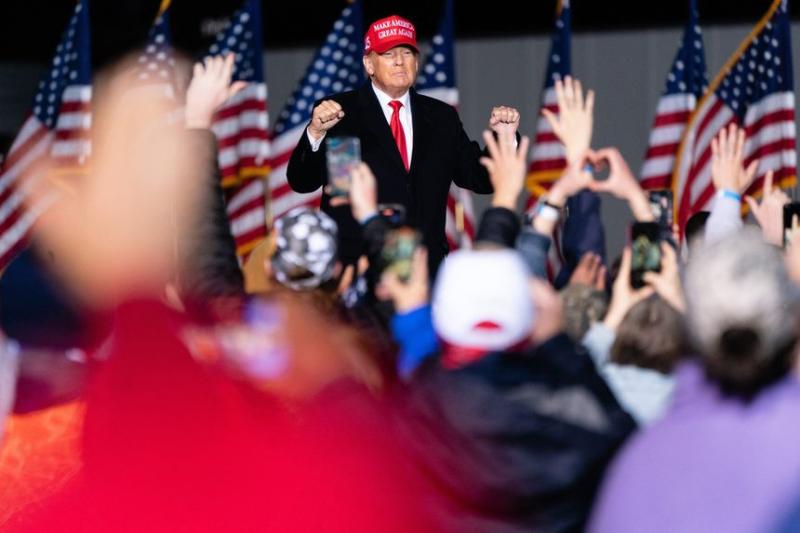GOP Lawmakers Embrace Trump Agenda, With or Without Donald Trump
By: Natalie Andrews and Eliza Collins (WSJ)



PONTE VEDRA BEACH, Fla.—Republicans heading into the heart of the midterm primary season have disagreements over Donald Trump's future in the party. But they say they are largely united behind his populist domestic agenda in fighting to win back control of Congress.
Interviews with about two dozen lawmakers at a recent House gathering in the Sunshine State and back in Washington show a party still grappling with how much wiggle room lawmakers have in their relationship with Mr. Trump and his politically polarizing persona. At the same time, most are embracing his record on such issues as immigration and energy policy, as they draw a contrast with President Biden and his fellow Democrats, who control the House and Senate.
Sen. Roger Marshall (R., Kan.) sees a comparison between Mr. Trump and Elvis Presley. “I don’t know what President Trump’s future holds, but I think the rock ’n’ roll music’s still playing,” he said.
To win the presidency in 2016, Mr. Trump pulled in blue-collar voters who had previously picked Democratic candidates or sat out elections. Republicans across the ideological spectrum say they want to keep those voters in the fold, even without Mr. Trump at the helm of the party.
House Minority Leader Kevin McCarthy (R., Calif.) said that the former president could be most helpful by comparing his policy agenda with President Biden’s.
“Just look at the policy differences between him and Biden where we were on an energy level, where we were internationally, where we were economically,” said Mr. McCarthy in a recent interview. “The more that he focuses on the differences in policy, I think he could be a great deal of help to people in the next election. He still has a megaphone.”
Mr. McCarthy has remained in close contact with the former president, and the pair talk frequently about efforts to win the House back in 2022.
Mr. Trump backed tougher border enforcement, embraced expanded fossil-fuel energy production in the U.S. and passed broad tax cuts, among other policy moves. He also presided over a fast-growing economy that lifted jobs and wages, before being derailed by the Covid-19 pandemic, which opponents said he mishandled. Now concerns about the economy, notably inflation, as well as immigration and tax policy, are once again on the front burner on Capitol Hill.
Mr. Trump’s foreign-policy legacy within the party is more mixed, particularly in the midst of the Russian invasion of Ukraine. Some Republicans have gravitated toward the former president’s “America First” outlook limiting U.S. engagement abroad, while others say the invasion shows the importance of America’s global leadership.
Republican lawmakers have criticized Mr. Trump over comments about the war, including when he praised some of Russian President Vladimir Putin ’s initial tactics as “genius.”
Across the Capitol, Senate Minority Leader Mitch McConnell is emphasizing candidates’ electability—not Trumpism—to take back control of the 50-50 chamber. He has had a strained relationship with Mr. Trump, and they haven’t talked since December 2020.
“How you feel about former President Trump is irrelevant,” Mr. McConnell said at a Punchbowl News event, calling such a standard for candidates an “illogical litmus test.”
An NBC News poll taken last month found that 40% of Republican respondents considered themselves to be more supporters of Mr. Trump, while 53% considered themselves to be more supporters of the party as a whole. When he was in the White House, polling consistently found more Republicans saying they backed Mr. Trump than the party.
Mr. McConnell and some other Republicans have complained about Mr. Trump’s continued fixation on the 2020 election. The former president still uses his rallies and frequent statements to falsely claim that widespread voter fraud cost him the presidency, and he has criticized Republicans who say President Biden won.
Mr. McConnell is backing the re-election effort of Sen. Lisa Murkowski (R., Alaska), who voted to convict Mr. Trump in his second impeachment trial. Mr. McConnell attempted to recruit several Republicans who have been critical of or have broken with the former president, including Arizona Gov. Doug Ducey, to run for Senate.
Others Republicans warned that loyalty to Mr. Trump—not just his policies—remains essential to winning elections.
“Most candidates, to a person actually, who run and win today are supportive of President Trump, and I think that shows where the electorate is but also where our candidates are,” said House Republican Conference Chair Elise Stefanik (R., N.Y.) in an interview.
Ms. Stefanik replaced Rep. Liz Cheney as conference chair after the Wyoming Republican voted to impeach Mr. Trump and continued to criticize him over the Jan. 6, 2021, riot at the Capitol. Mr. Trump has endorsed her opponent, Harriet Hageman, as has Mr. McCarthy. On Wednesday, Mr. McCarthy headlined a Washington, D.C., fundraiser for Ms. Hageman, with dozens of Republican lawmakers.
Some lawmakers say matters aren’t clear-cut. GOP Rep. Don Bacon of Nebraska, who described his supporters in his Omaha-area district as a mix between Reagan Republicans and Trump supporters, was one of 13 House Republicans who voted for last year’s bipartisan infrastructure bill, which Mr. Trump opposed. Mr. Trump called for a primary challenger to Mr. Bacon, but he hasn’t been further involved and no serious opponent has emerged.
“It’s important to not burn those bridges” between wings of the party, Mr. Bacon said. “The policies, that’s what can unify us.”
Mr. Trump has remained active in politics ahead of a possible run in the 2024 presidential election. He has endorsed roughly 130 candidates, mostly for federal office but also in municipal elections.
Taylor Budowich, a spokesman for Mr. Trump, said the former president is working to elect fighters to “sweep the MAGA movement into the congressional majority.”
The biggest clear-out from Congress among Trump skeptics has been with the lawmakers who voted to impeach him in January 2021 over the charge that he incited an insurrection at the Capitol, when some supporters tried to stop the certification of Mr. Biden’s election win.
Of the 10 House members in the GOP who voted to impeach Mr. Trump, three—Reps. Adam Kinzinger of Illinois, Anthony Gonzalez of Ohio and John Katko of New York—decided not to seek re-election. One other, Michigan Rep. Fred Upton, said: “I’m on the dark side of Trump, his dark side,” because of the vote for impeachment. Still, he said he often supported Mr. Trump when he was president, highlighting the 2017 tax-cut bill.
Of the seven Republican senators who voted to convict Mr. Trump in his second impeachment trial, only Ms. Murkowski is up for re-election this fall, and she faces an opponent backed by Mr. Trump. In other races, Mr. Trump has supported two candidates, Herschel Walker in Georgia and Adam Laxalt in Nevada, running for Democratic-held Senate seats. He recently unendorsed Rep. Mo Brooks in the U.S. Senate race in Alabama.


